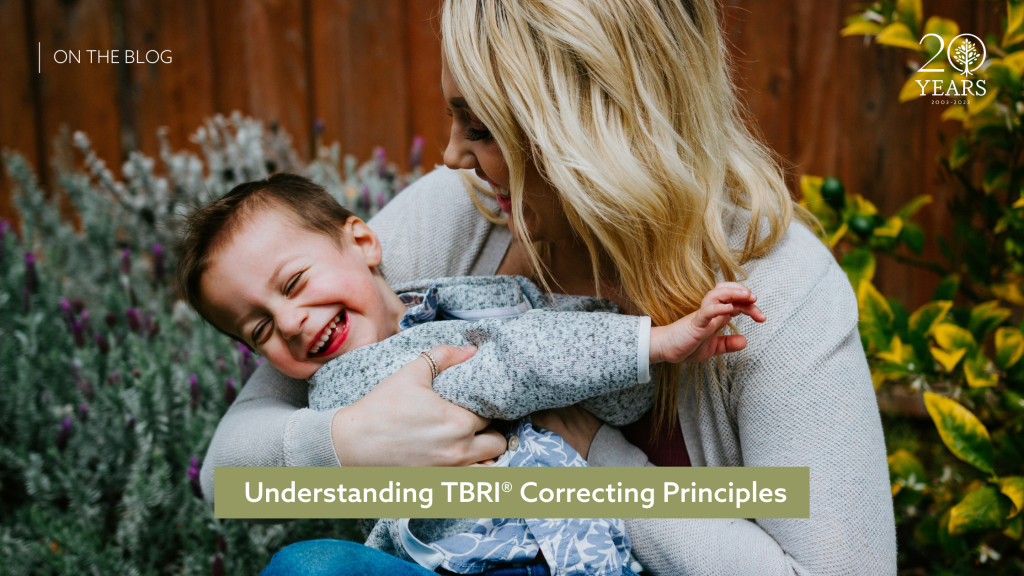TBRI® Correcting Principles: Understanding The IDEAL Response

Trust-Based Relational Intervention® (TBRI) is a care model designed to help meet relational and developmental needs of children and youth impacted by trauma. TBRI considers the whole child—his or her brain, biology, behavior, body, and beliefs—and provides parents and caregivers with practical tools and insight to help their child(ren) reach his or her highest potential. And, perhaps most integral, TBRI has connection at its core—the truth that connection builds trust, and trust builds healthy relationships.
Developed by Dr. Karyn Purvis and Dr. David Cross of the Karyn Purvis Institute of Child Development (KPICD) at TCU, the TBRI model is built upon three guiding principles:
Connecting Principles: Create connections that disarm fear, gain trust, and enhance learning.
Empowering Principles: Strengthen learning and regulation by meeting a child’s physical and environmental needs.
Correcting Principles: Shape beliefs and behaviors effectively, so children feel safe, protected, and empowered.
Correcting Principles
Goals: To help children learn appropriate strategies for getting their needs met and to learn to navigate successful interactions throughout their day.
Hallmarks of Connected Parenting
+ Time-ins vs. Time-outs
+ Compromises vs. Consequences
+ Problem-solving vs. Lectures
+ Advocacy stance vs. Adversary stance
+ Focus on your child’s preciousness vs. Focus on his or her failures
Correcting Principle: The IDEAL Response
Immediate: Respond immediately.
Direct: Engage directly (with eyes, proximity, and touch when possible).
Efficient: Maximize playfulness when possible, and use only the Level of Response that is essential for addressing the challenge.
Action-Based: Give your child a chance for a “redo.” Maximize learning by creating body memory for the right choices.
Leveled: Direct at the behavior, not the child. Make it clear to your child that you are his or her advocate, not adversary.
Solving behavioral challenges quickly and effectively while building connection between the parent or caregiver and child is a primary feature of TBRI.
Foundational to TBRI is the premise that most behavior is driven by unmet needs. Ask yourself the following questions when your child or teen is using behavior to communicate something he or she doesn’t have the words to express:
- What is this behavior really saying?
- What does your child really need?
- How can I teach my child to get his or her needs met?
- How can I teach this skill at a calmer time?
To help disarm fear and negative behaviors in children or teenagers who are being disruptive, consider asking questions like:
- Can you tell me what you need?
- How can I help you?
Correcting Principle: Levels of Response:
Level 1: Playful Engagement
Challenge: This is a low-level challenge in which your child is disrespectful or dysregulated in some way.
He or she may roll his or her eyes, speak without raising his or her hand, grab something without your permission, etc.
At this level, there is no threat of danger or physical harm.
Opportunity: Tremendous learning can occur at this level of intervention because the response can still be playful.
Children learn at this level if the adult is consistent. In TBRI-informed environments where adults are connecting, empowering, and teaching proactively, 70 to 80 percent of challenging behaviors can be addressed at this level.
Goal: Simply give your child an opportunity to “redo” the behavior. Since motor memory is formed through active participation, deep learning occurs.
Level 2: Structured Engagement
Challenge: This is a higher-level challenge and/or one that was not resolved with Playful Engagement. No one is in danger, and there is no physical threat. But if mishandled, there is a potential for escalation.
At this level, the adult should provide additional attention and structure.
Opportunity: Learning can still occur at this level because your child’s fight-flight-freeze system is not fully activated.
Although it may take a couple of minutes, this is still a great win for both you and your child.
Situation: Your child refuses to pick up his or her toys.
Response: You will need to pick up your toys, but you can do it now or after lunch. Which do you choose?
When it’s over, it’s over! (The goal is to demonstrate to the child that his or her value is not defined by the episode.)
Immediately return to Level 1: Playful Engagement.
Goal: Providing “choices” gives the child or teen a sense of safety and active participation in the resolution. Again, give the child an opportunity to “redo” the behavior, which contributes to motor memory and deep learning.
Level 3: Calming Engagement
Challenge: At this level, the challenge is escalated, and your child may be at risk of becoming violent. You must remain laser-focused and attentive in order to help your child de-escalate.
Opportunity: An unexpected opportunity arises out of this more significant level of challenge because your child can see your commitment to help him or her through this “hard place.”
Handled correctly, a Level 3 challenge can become a tremendous opportunity for connection and growth.
Again, when it is over, it’s over! Return to Level 1: Playful Engagement.
You must remain calm and focused. Your voice should be firm but not threatening. Use fewer words, and talk more slowly because cognitive areas of the brain are less active during periods of fight-flight-freeze responses.
Note: When the child has returned to a calm state, a redo can be requested when possible. Only request a redo to encourage learning, never to shame or punish.
Goal: Support your child’s or teen’s need to regulate. Another goal is to prevent a full-blown crisis.
Level 4: Protective Engagement
Challenge: At this level, there is an active threat of danger and/or physical harm. Protection must be provided for your child as well as others who are nearby.
Opportunity: The most powerful message you can give your child or teen is the knowledge that you can keep him or her safe and that you know your child’s behavior is not what defines him or her.
Situation: Your child becomes physically or verbally threatening and/or begins a behavioral meltdown, doing damage to property or persons nearby.
Response: Remove either your child or those in close proximity. If necessary, seek help from an adult who can stay with other children while you stay with your child who is struggling to regulate. Find a private, quiet space where your child can be kept safe and is not alone. Remove objects that might become harmful to your child or others.
Goal: The immediate goal is to provide safety for all who are involved, including your child.
Remember, particularly in Protective Engagement situations, the goal is to demonstrate to the child or teen that his or her value is not defined by the episode. As time allows (which may take days or weeks), look for opportunities to process the event(s) with your child or teen to foster greater connection.
Practical Application
Guiding Thought
It is better to err and repair than to have never erred at all. — Dr. David Cross
Questions & Reflections
– How could you “practice outside the moment” to help create a new pattern of behavior or interaction—for both you and your child?
– Which elements of the IDEAL Response come more naturally to you? Which do you struggle with and why?
– When thinking about calming engagement, what helps you regulate and calm? What helps your child regulate and calm?
– As you consider your current strategies, how can you correct while staying connected and building greater trust with your child or teen?
Tips & Reminders
– Implement behavioral scripts—the actions of a trauma-informed culture that seek to reduce escalation and teach self-regulation skills.
+ Choices (“You have two choices”—choices given are never threats or punishments.)
+ Compromises (“Would you like a compromise?”)
+ Behavioral Re-Do’s (“Can you try that again with respect?”)
– Take a deep breath. Breathing deeply will oxygenate the body and brain, helping children and teens (and you!) think more clearly, learn more easily, calm down, and make better behavioral choices.
Action Points
Life Value Terms
Common in TBRI and trauma-informed cultures, Life Value Terms create an effective, efficient mode of communication that avoids lengthy lectures and can be used in times of stress or dysregulation. We encourage you to develop your own Life Value Terms, suited for your daily interactions with your child or teen. Consider even posting these on your refrigerator or a common space in your home. The following are some ideas to get you thinking as you develop ones for your family.
+ “Gentle and Kind”
+ “Using Words”
+ ”Accepting ‘No’”
+ “With Permission and Supervision”
+ “With Respect”
For the Everyday
The “TBRI Mantra,” as coined by Dr. David Cross, is one to think through, memorize, and call to mind on a daily basis.
+ Stay Calm (No Matter What)
+ See the Need (Behind the Behavior)
+ Meet the Need (Find a Way)
+ Don’t Quit (If Not You, Then Who?)
Watch Mark Ottinger, from Empowered to Connect, walk step by step through a real-life interaction using the IDEAL Response.



